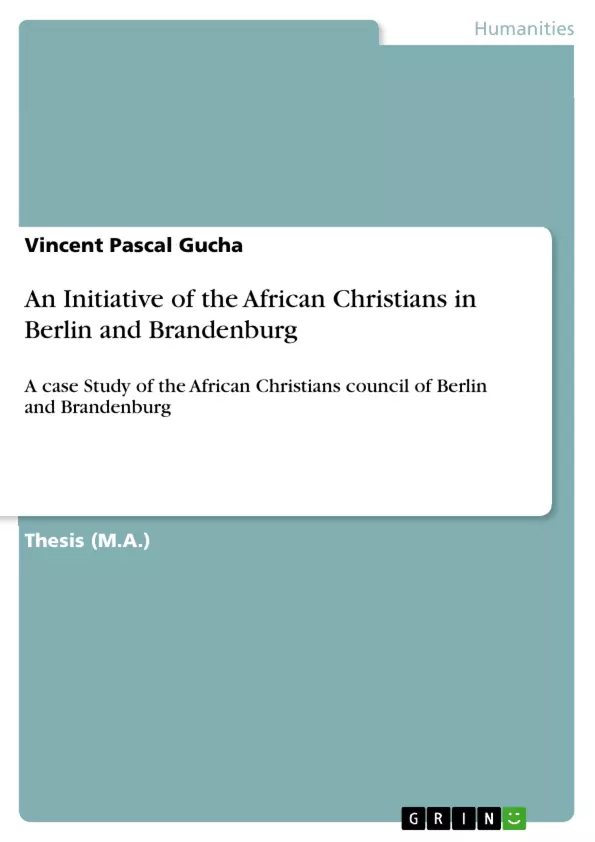This is a qualitative research carried out in a Christian organization known as the African Christian Council of Berlin and Brandenburg (RACIBB) and it is a product of narrative description and explanation of the life experiences’ and perceptions of the informants. The research has used migration and religion trajectories; the two trajectories are deemed appropriate for the study because of the nature of the organization (RACIBB). It is an organization founded by the people and for the people with African migrant backgrounds and at the same time operates as a faith-based organization although not in the manner it serves the people. Migratory movement has often resulted into formation of macrostructures, according to Adogame, macrostructures are the informal social networks developed by the migrants to assist them in adjusting to the migration and settlement e.g. the informal networks can be family or community ties (the community can be religious, cultural, ethnic and social ties). As realised during the study some of these macrostructures are later developed to formal Organizations under the state law of the host country. One of the advantages when founded within the perimeters of the law is that the organization is free to implement its activities and can apply for financial assistance from any funding institution.
Most of the migrant founded organizations like RACIBB are multi-functional by nature depending on the needs of the members hence their functions can be categorised as follows: Ethno-solidarity, Ethno-cultural, Ethno-specific religious and Ethno-specific political Diaspora activities. Ethno-solidarity activities aim at addressing social and integration issues among its members, for example, it provides members with the information about the host country; what is expected of them and what they can do to live comfortably in the host society.
Inhaltsverzeichnis (Table of Contents)
- CHAPTER ONE
- INTRODUCTION
- 1.0 Background of the study
- 1.1 Objectives of the study
- 1.2 Research Questions
- 1.3 Hypotheses for the study
- 1.4 Significance of the study
- 1.5 Structure of the study report
- CHAPTER TWO
- LITERATURE REVIEW
- CHAPTER THREE
- RESEARCH METHODOLOGY
- 3.0 Target Population
- 3.1 Sample size and sampling Techniques
- 3.2 Data Collection methods
- 3.3 Data Collection Procedures
- 3.4 Data Analysis Techniques
- 3.5 Ethical Considerations
- 3.6 Challenges of the Research
- CHAPTER FOUR
- DATA PRESENTATION AND INTERPRETATION
- 4.0 Brief history of Africans in Berlin
- 4.1 The current-general situation of Africans in Berlin
- 4.2 The foundation of the Council (RACIBB)
- 4.3 Reasons for the foundation of the council
- 4.4 Membership of the council
- 4.5 Motivation of the members to join the RACIBB
- 4.6 The projects and activities of the council within Berlin-Brandenburg
- 4.7 Partnering and Networking in RACIBB
- 4.8 The challenges of the council
- 4.9 The future plans of the council
Zielsetzung und Themenschwerpunkte (Objectives and Key Themes)
This thesis examines the African Christians Council of Berlin and Brandenburg (RACIBB), exploring its role in supporting and empowering African Christians in the region.
- The establishment and development of RACIBB within the context of African migration to Berlin.
- The motivations and challenges faced by members of RACIBB.
- The projects and activities undertaken by RACIBB to serve the African Christian community.
- The role of inter-religious and intercultural dialogue in the work of RACIBB.
- The future plans and goals of RACIBB in promoting social justice and inclusion.
Zusammenfassung der Kapitel (Chapter Summaries)
Chapter One introduces the background of the study, outlining the objectives, research questions, hypotheses, and significance of the research. It also provides a brief overview of the structure of the thesis report.
Chapter Two presents a review of relevant literature concerning African Christian communities in Germany and the role of interreligious dialogue in promoting social cohesion.
Chapter Three outlines the research methodology employed in this study, including the target population, sampling techniques, data collection methods, and data analysis techniques.
Chapter Four presents and interprets the data collected through interviews, observations, and document analysis. It explores the historical context of African migration to Berlin, the foundation and activities of RACIBB, and the challenges and future plans of the council.
Schlüsselwörter (Keywords)
This research focuses on the African Christians Council of Berlin and Brandenburg (RACIBB), exploring themes of African migration, intercultural theology, interreligious dialogue, social justice, and the role of Christian communities in promoting inclusion and empowerment.
- Quote paper
- Vincent Pascal Gucha (Author), 2014, An Initiative of the African Christians in Berlin and Brandenburg, Munich, GRIN Verlag, https://www.hausarbeiten.de/document/283148


